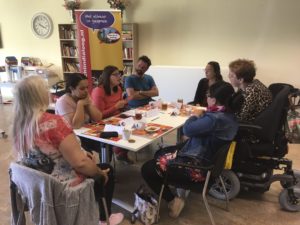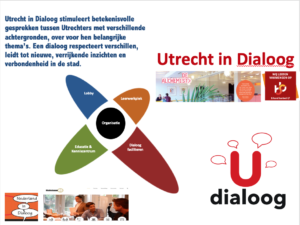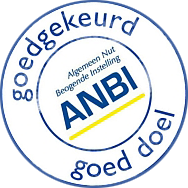 For more than 10 years, Utrecht in Dialoog has been stimulating meaningful conversations between people from Utrecht with different backgrounds about important themes. A dialogue respects differences, leads to new, enriching insights and connectedness in the city.
For more than 10 years, Utrecht in Dialoog has been stimulating meaningful conversations between people from Utrecht with different backgrounds about important themes. A dialogue respects differences, leads to new, enriching insights and connectedness in the city.
Utrecht in Dialogue can only make dialogue possible in collaboration with others. Around 100 volunteers work with 100 partners in the city for a connected city and inclusive communities. We also value differences in our network and organization.
What is Utrecht in Dialoog?
 Utrecht in Dialoog is an initiative of people and organizations in Utrecht who support dialogue and are committed to this. Utrecht in Dialoog brings people together in an inspiring, meaningful conversation about important topics. By exchanging experiences, ideas and dreams in small groups at dialogue tables, residents get a voice, differences and similarities become visible and space is created for different perspectives, new insights, personal action and change. The diverse backgrounds of participants increases and deepens insight. This is how new forms of living together arise in a diverse Utrecht. A dialogue respects differences, leads to new, enriching insights and connectedness in the city.
Utrecht in Dialoog is an initiative of people and organizations in Utrecht who support dialogue and are committed to this. Utrecht in Dialoog brings people together in an inspiring, meaningful conversation about important topics. By exchanging experiences, ideas and dreams in small groups at dialogue tables, residents get a voice, differences and similarities become visible and space is created for different perspectives, new insights, personal action and change. The diverse backgrounds of participants increases and deepens insight. This is how new forms of living together arise in a diverse Utrecht. A dialogue respects differences, leads to new, enriching insights and connectedness in the city.
What does Utrecht in Dialoog do?
 Utrecht in Dialoog creates space for dialogue in the city to make difficult and complex issues negotiable and manageable. When people listen to each other, enter into dialogue with each other on an equal basis, and share perspectives, new room for maneuver is created to guide the way in which we live together based on our own responsibility.
Utrecht in Dialoog creates space for dialogue in the city to make difficult and complex issues negotiable and manageable. When people listen to each other, enter into dialogue with each other on an equal basis, and share perspectives, new room for maneuver is created to guide the way in which we live together based on our own responsibility.
Utrecht in Dialogue facilitates dialogue with more than 100 partners at around 50 locations in all neighborhoods of the city, in neighborhoods, care and education, with newcomers, young people, children and the elderly. Around current social issues such as polarization, discrimination, exclusion, refugees, poverty, loneliness and climate. And to give shape and content to those involved with transitions and changes in care, education, housing, participation, culture, (neighborhood) democracy, inclusion, energy…
Read more about what Utrecht has been doing in dialogue over the past 10 years (in Dutch) >>>>
 Core activities
Core activities
The core activities of Utrecht in Dialogue are:
– design, organize and facilitate dialogue activities in co-creation with partners on current issues, ambitions and themes;
– training dialogue counselors in the application of the dialogue methodology and guiding dialogue teams in giving content to themes/issues in dialogue;
– advertise dialogue activities and dialogue experiences, in order to broaden participation and application, to increase diversity and reach;
– advise, guide and facilitate partnerships, initiatives and organizations in shaping changes and transitions in a more dialogical way of working (together).
Gifts welcome!
Donations and voluntary contributions are tax deductible and can be transferred to NL43 INGB 0007 6336 31 t.v. Utrecht Foundation in Dialogue. For questions or an appointment mail to info@utrechtindialoog.nl.
Independent Foundation
 Utrecht in Dialoog is an independent ANBI Foundation with the aim: ‘To connect, strengthen and enrich Utrecht people through dialogue and furthermore everything that is related to it in the broadest sense, belongs to it and/or can be conducive to it.’ The Foundation is located at Maliebaan 45, 3581CD in Utrecht, registered with the Chamber of Commerce under Chamber of Commerce number: 67911048, and with the tax authorities known under RSIN number: 857222107. Stichting Utrecht in Dialoog receives a subsidy from the municipality of Utrecht, a contribution from the VSB fund, contributions and in-kind sponsorship and donations.
Utrecht in Dialoog is an independent ANBI Foundation with the aim: ‘To connect, strengthen and enrich Utrecht people through dialogue and furthermore everything that is related to it in the broadest sense, belongs to it and/or can be conducive to it.’ The Foundation is located at Maliebaan 45, 3581CD in Utrecht, registered with the Chamber of Commerce under Chamber of Commerce number: 67911048, and with the tax authorities known under RSIN number: 857222107. Stichting Utrecht in Dialoog receives a subsidy from the municipality of Utrecht, a contribution from the VSB fund, contributions and in-kind sponsorship and donations.
The board of Utrecht in Dialogue is unpaid and consists of Hannie van Baren (chairman), Maria Verhoeven (secretary), Jan Kruit (treasurer) and Heico ten Cate. The Board of Utrecht in Dialogue has laid down its working methods in a set of house rules and a Privacy Statement. The board regularly updates its Long-Term Strategy and translates this every year into a Work Plan with a budget (all in Dutch). The board can be reached at bestuur@utrechtindialoog.nl. The daily routine is outsourced to Wilma de Buck and Nynke van der Veldt.
Also view the annual reports, multi-year strategies and work plans in the archive (in Dutch) >>>>
Sponsor
Utrecht in Dialoog is supported and funded by the Municipality of Utrecht, VSB Fund, Sluytermaan van Loofonds, RCOAK Foundation and Elise Mathilde Fund. The Maliebaan45 and the Kargadoor offer Utrecht in Dialoog workspace and facilities.
Together with Partners

A dialogue can only be made possible with the collaboration of many other partners bringing different perspectives. Therefore, Utrecht in Dialoog works with more than 100 partners in the city to enable dialogue and increase the influence.
Important partners from Utrecht: Armoedecoalitie Utrecht, Ouders van Betekenis, Netwerk Informele Zorg Utrecht, Gezondheidspact Utrecht, Resto van Harte, Lunetten Wil Wel, De Nieuwe Jutter, Stichting Asha, OostVoorElkaar, Al Amal, DOCK, U-Centraal, Bibliotheek Utrecht, Bibliotheek Overvecht, Wijkwijzer Noordoost, Knooppunt Lunetten, Kracht van Zuilen, Buurtwerkkamer De Verbinding Zuilen, BuurtThuis Kanaleneiland, Krachtstation Kanaleneiland, Utrecht Natuurlijk, BO-EX, De Kargadoor, BAK Basis voor actuele kunst, RAUM, Domkerk Utrecht, Starters4Communities, ROC Midden Nederland, Hogeschool Utrecht, Community Based Research for Humanities, Universiteit voor Humanistiek, UNION en XWebinar.
Regional partners: PAXVoorVrede, Europadag Utrecht, Dialogue Zone Dayton University, TEJO Nederland, Floor JongerenCoaching, International Welcome Center Utrecht Region, Womeninc Utrecht, Omzien naar Elkaar en Haarlem in Dialoog.
Other partners: Stichting Lezen & Schrijven, Religiesvoorvrede, ACO Utrecht, Pharos, Roze50plus, Enik Recovery College, Legulas, Tröst, Humanitas Utrecht, De Tussenvoorziening, Lister, Ubuntuhuis, University College, UinDeWijk, Buurtcamping, Hogeschool van Amsterdam, Yvote, Town & Gown, Faces of Change, 20 jaar leidsche rijn, Plein 373, Leerwerkbedrijf Terecht Podium Oost, Tori Oso, UPLR, Human Rights Utrecht, So Ubuntu, Actieve Jongeren Utrecht, Nisbo, het Zonnetje, Ak-der, Power by Peers, CNV Connectief, Leidsche Rijn College, Buzinezz Club Utrecht, Werken aan de Toekomst, Buurtwerkkamer TOP, Salon van Weleer, Utregs requiem, Critical Mass, de Wilg, Hart voor Leidsche Rijn, Stichting Zooi, DOK030, Bahai Utrecht Overvecht, Gewenst Eigen Initiatief, Tweetakt, Welkom in Utrecht, Plan Einstein, Welkom in Utrecht, Stichting Vredeseducatie & Democratiefabriek, Artikel 1 Midden Nederland, Bibliotheek Cereolfabriek, Socratisch Cafe Utrecht, Telefonische Hulpdienst Utrecht, Midzomergrachtfestival, Bibliotheek Vleuterweide, Bibliotheek Kanaleneiland, Buurtcentrum Oase, Bij Boshardt Leger des Heils, Villa Vrede, Werken aan de Toekomst, Bartelomeus Gasthuis, Huiskamer Transwijk, Tegenlicht Utrecht, Sint Maartensberaad, Utrechts Stadsdichtersgilde, Stichting Desalniettemin, De Voorkamer, Wijkbureau Leidsche Rijn, Leer je landgenoten kennen, Kees Voorberg, Mijnie Oostrom, Zorg Verandert, ZininUtrecht, Kracht van Utrecht, MaatschapWij, De Dame Zuilen, Buurtcentrum De Pijler, Trajectum College, Rijkswaterstaat, Histos, Coffeemania bij De Boogh, Omzien naar Elkaar, Nederland Zorgt voor Elkaar, Goes in Dialoog, Fort aan de Klop, Partagejournal, Zinnenprikkels, Saluti, Ludens, Spelenderwijs, New Dutch Connections, Instituut voor Interventiekunde, Respect Education Foundation, Huisartsenpraktijk De Gagel, Galerie SANAA, Atelier Gea van Eck,Wordbites, Hart van Hoograven, Roobolkapel Zuilen, Sociaal Vitaal en E-vonne.
Active involvement
The core of Utrecht in dialogue is formed by a team of volunteers, trainees, students, reintegrators, job seekers, trainees, newcomers and pensionadas who enable dialogue with partners and dialogue leaders.
Utrecht in Dialoog has a pool of dialogue facilitators, ambassadors and dialogue experts who regularly or occasionally organize and guide dialogue tables, research and elaborate themes, explore new forms and organize workshops. Dialogue facilitators and other stakeholders meet in Maliebaan 45 (first Wednesday evening of the month).


